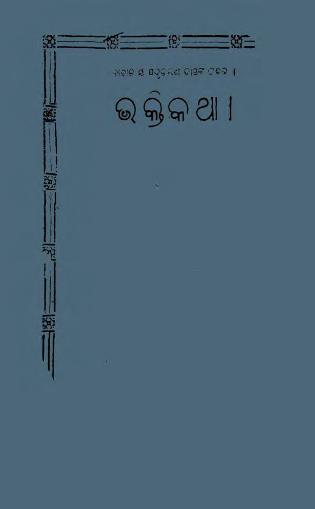In the rich tapestry of Odia literature, Bhaktikatha, penned by the eminent poet Padma Charana Das in 1923, stands out as a significant work that encapsulates the devotional fervor and deep spiritual insights prevalent in the Odia cultural landscape. This poetic masterpiece serves not only as a reflection of the poet’s deep-rooted bhakti (devotion) but also as a mirror to the socio-religious ethos of the time.
Emerging during a period of societal transformation in Odisha, Bhaktikatha resonates with the spiritual awakening that swept through India in the early 20th century. Influenced by the Bhakti movement, which emphasized personal devotion to God over ritualistic practices, Padma Charana Das harnessed the power of poetry to express a profound connection with the divine. His verses in Bhaktikatha are imbued with rich imagery and emotional depth, appealing not just to the intellect but also to the heart.
The structure of Bhaktikatha is characterized by its lyrical quality, blending narrative and poetry seamlessly. The verses celebrate various deities and narrate stories of devotion, sacrifice, and divine grace. The poet adopts a narrative style that draws readers into the lives of fervent devotees, presenting their struggles and triumphs in attaining a deeper understanding of spirituality. Each poem serves as a subtext, exploring the intricate relationship between the human soul and the divine.
The sub-poetries within Bhaktikatha delve into specific aspects of devotion and are rich with allegorical significance. For instance, one notable sub-poetry reflects on the essence of surrendering oneself to God. Here, Das uses powerful metaphors to illustrate the turmoil of human emotions and the solace found in faith. The imagery of a turbulent sea calms once the devotee abandons their ego, surrendering to the divine will, beautifully encapsulates the core of Bhakti philosophy.
Another poignant sub-poetry addresses the bonds of love between a devotee and their deity. Through vivid descriptions and heartfelt expressions, Das captures moments of divine grace that illuminate the darkest corners of life. This thematic exploration resonates with readers, inviting them to reflect on their spiritual journeys and the unconditional love that exists between humankind and the divine.
Padma Charana Das’s use of the Odia language is both accessible and profound. He employs simple yet evocative language that resonates with the common man, bridging the gap between the divine and the everyday experience. The rhythmic flow of his verse enhances the lyrical quality, making the poetry not only a treat to the mind but also to the ear.
Bhaktikatha has left an indelible mark on Odia literature, inspiring subsequent generations of poets and writers. Das’s ability to weave intricate spiritual themes into accessible poetry ensures that the legacy of his work endures. His celebration of bhakti continues to inspire readers, encouraging them to explore their own spiritual paths.
Books Info
| Books name | Bhaktikatha / ଭକ୍ତିକଥା |
| Author | Padma Charana Das |
| No Of pages | 379 |
| Publisher | Sri Madhusudan Das |
| Publication | 1923 |
| Printed At | The Dutta Press |
| Distributor | NA |

